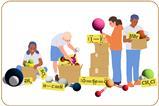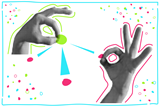David Read suggests strategies to develop pedagogical content knowledge, inspired by a database of chemistry teaching approaches
A team of researchers investigated and analysed teaching strategies used by tertiary chemistry educators, and created a searchable website using the data. The researchers, led by Madeleine Schultz at the Queensland University of Technology, intend their website to be a starting point for tertiary chemistry teachers to improve their teaching using others’ strategies. As many of the topics are also found in ages 16–18 school curricula in the UK, the site should be interesting for secondary chemistry teachers.

Madeleine’s team adapted a tool that has been used extensively to collate secondary teachers’ professional knowledge in order to probe tertiary teachers’ understanding of their practice. The tool is known as Loughran’s CoRe (Content Representation). In a series of workshops, the team asked tertiary chemistry educators from 25 different institutions in Australia questions relating to a big idea in chemistry they taught. Their questions probed: why participants thought the idea was important for students to learn; what participants knew about their students’ thinking on the idea and how it influenced their teaching; and how they would find out their students’ grasp of the material. They also asked about the strategies educators used, their reasons for choosing them and their source.
Data from the workshops generated the online database of 300 teaching strategies, searchable by 19 topics typically covered in introductory chemistry courses. The data also provided insight into the processes behind participants’ design of their teaching. The researchers found the approaches described by participants parallel to those already known to be used by secondary chemistry teachers.
Effective teaching made explicit
One motivation for the study, and for creating the database, was to assist tertiary teachers’ professional development. While tertiary teachers will typically have deep subject knowledge, this depth may be restricted to the specialist field of their PhD. Their weaker understanding of sub-disciplinary areas outside their specialism may be problematic when teaching first-year level topics.
Additionally, tertiary educators are not explicitly trained in pedagogical content knowledge (PCK). Subject, or content, knowledge is the raw knowledge of chemistry and its concepts, and pedagogical knowledge is knowledge of the theories of teaching and learning. PCK bridges the two and includes aspects, such as representations, analogies and explanations, that characterise effective teaching in a particular discipline. The workshop experience itself impacted positively on teaching practice; many participants were considering PCK and expressing teaching strategies for the first time.
Interest in PCK appears to be growing, as is recognition that its development is a key factor in a teacher moving from novice to expert. Much of the research so far has been at school level.
Teaching tips
Although the website hosting all of the strategies and resources collected during the workshops relates to first year degree level chemistry in Australian universities, many of the topics are also found in ages 16–18 school curricula
Although the website hosting all of the strategies and resources collected during the workshops relates to first year degree level chemistry in Australian universities, many of the topics are also found in ages 16–18 school curricula. Visit the website and explore its content: bit.ly/2IYaT0A.
Teacher training, in the UK at least, is focused on the development of pedagogical knowledge and general classroom management. While subject-specific knowledge is often addressed, there simply isn’t time to go into great depth. Furthermore, the concept of PCK probably goes unmentioned, with very few teachers being familiar with the idea. However, since PCK is the essence of effective teaching, it is crucial that we develop it.
Evidence suggests that PCK does develop with experience, but teachers might accelerate this if they directly address its role in their teaching. Think through the rationale for choosing a particular approach when teaching a topic, for example the use of model kits when teaching organic compounds nomenclature. Guide your thinking using the questions below, which are based on the CoRe analysis used by the Australian research team. Ask yourself:
- What is important for students to know about this idea/concept and why is it important for them to know it?
- What do you know about students’ thinking that influences your teaching of this idea/concept?
- What teaching strategies will you use and why have you chosen them to engage students?
- How will you monitor students’ progress in developing an understanding of the idea?
It is also worth looking ahead and thinking about how the strategies you are using now impact on topics that are coming up later in the year. As with anything, working in teams is likely to give success. Colleagues can provide support and ideas, which could be beneficial for all.
These are all things many teachers already do, but perhaps subconsciously. There’s strong evidence to suggest that doing it explicitly has a positive impact on teaching practice.
References
M Schultz et al., Chem. Educ. Res. Pract., 2018, 19, 508 (DOI: 10.1039/c7rp00251c)














No comments yet